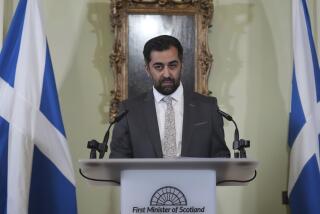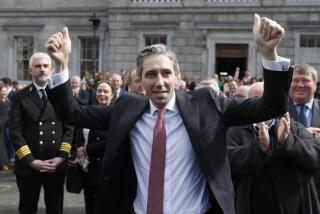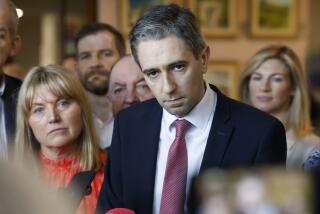He Will Head Caretaker Government in Time of Uncertainty : Humiliated, Haughey Quits as Ireland Premier
DUBLIN, Ireland — A publicly humiliated Charles Haughey formally resigned as Ireland’s prime minister late Thursday, averting a possible constitutional crisis but leaving the country in a period of political uncertainty unprecedented in the 68-year history of the state.
Haughey, leader of the largest of six parties in the Dail (Parliament), acted in order to clear the way for new inter-party negotiations that could yet result in his reelection when lawmakers return for a special parliamentary session now scheduled for Monday.
But after Thursday’s developments, analysts here predicted that the man long known as “The Great Survivor” of Irish politics can only come out on top this time by agreeing to share power more meaningfully than ever before with some old-time rivals.
In any event, Ireland was officially in the hands of a caretaker administration Thursday night, with no guarantee that the extra time before next Monday’s special session will be sufficient for formation of a new government.
The country was on the verge of a full-blown constitutional crisis for a short time Thursday after Haughey refused to resign despite an 86-78 vote against him in the first nationally broadcast session of a new Dail elected two weeks earlier.
The Dail also rejected the only other candidates for the top job, however, and Haughey argued that as incumbent, the law permitted him “a reasonable amount of time to reflect, consider, and if necessary consult” in hopes of achieving a parliamentary majority.
But opposition leaders were determined to force his resignation, even if the gesture turns out to be mostly symbolic. Former Prime Minister Garret FitzGerald told the assembly, “I think that the situation is now a very serious one indeed, and that the rest of us must reflect how to deal with somebody who is not prepared to abide by the constitution.”
After a two-hour recess, during which rival parties circulated two motions that would have forced his hand, Haughey relented, announcing that in order to avoid even the appearance of impropriety, “I will . . . inform the president of my resignation this evening.”
The 63-year-old leader of the Fianna Fail (Soldiers of Destiny) party stressed that he was still convinced that it was within his rights to put off the move. However, he said: “It’s of crucial importance that we do not just legally uphold the constitution, but that we be seen to do so. Our people hold our constitution to be sacrosanct, and I would never wish to even appear to do otherwise than adhere strictly to the precepts of that constitution.”
Under the constitution, Haughey’s government will continue in a caretaker capacity until a new government is formed.
Failing a negotiated settlement among the parties, the Parliament would again be dissolved and new elections held.
Negotiations are centering on two other center-right parties--Fine Gael (Family of the Irish), the second-largest parliamentary grouping, and the Progressive Democrats, a party formed three years ago by Fianna Fail dissidents who objected to Haughey as overly autocratic. The differences among the three parties remain more of personality than of policy, according to independent analysts and party activists as well.
But Fine Gael has said it will back Haughey only if he agrees to an equal division of Cabinet seats and rotation of the prime minister’s job, the sort of deal pioneered by the Israeli government in 1984. The Progressive Democrats have also demanded a formal coalition with Cabinet representation.
Haughey insists publicly that he will not agree to a formal coalition. The best he has offered so far is participation in some reorganized parliamentary committees that would have a real say in framing government legislation.
Haughey has served as prime minister of a minority government since March, 1987, with the tacit support of both Fine Gael and the Progressive Democrats. However, in May he called a snap, early election in hopes of gaining the extra two seats Fianna Fail needed to have a ruling majority. Fianna Fail colleagues say his decision was based on favorable public opinion polls and a calculation that expected short-term increases in inflation and interest rates would make the party more vulnerable later.
But the move backfired when Irish voters, who had been generally pleased with the results of the government’s consensus economic policy, assessed it as political opportunism and punished Haughey for it at the polls. Instead of gaining two more seats, Fianna Fail lost four in June 15 balloting, causing political analysts here to describe the election as Haughey’s biggest political blunder ever.
With 77 seats in the 166-seat Dail, compared to only 55 for Fine Gael, Fianna Fail remains the only party with a realistic prospect of forming a new government.
In the wake of Haughey’s ill-fated early election move, however, the other parties are now demanding a much higher price for their cooperation.
More to Read
Sign up for Essential California
The most important California stories and recommendations in your inbox every morning.
You may occasionally receive promotional content from the Los Angeles Times.










